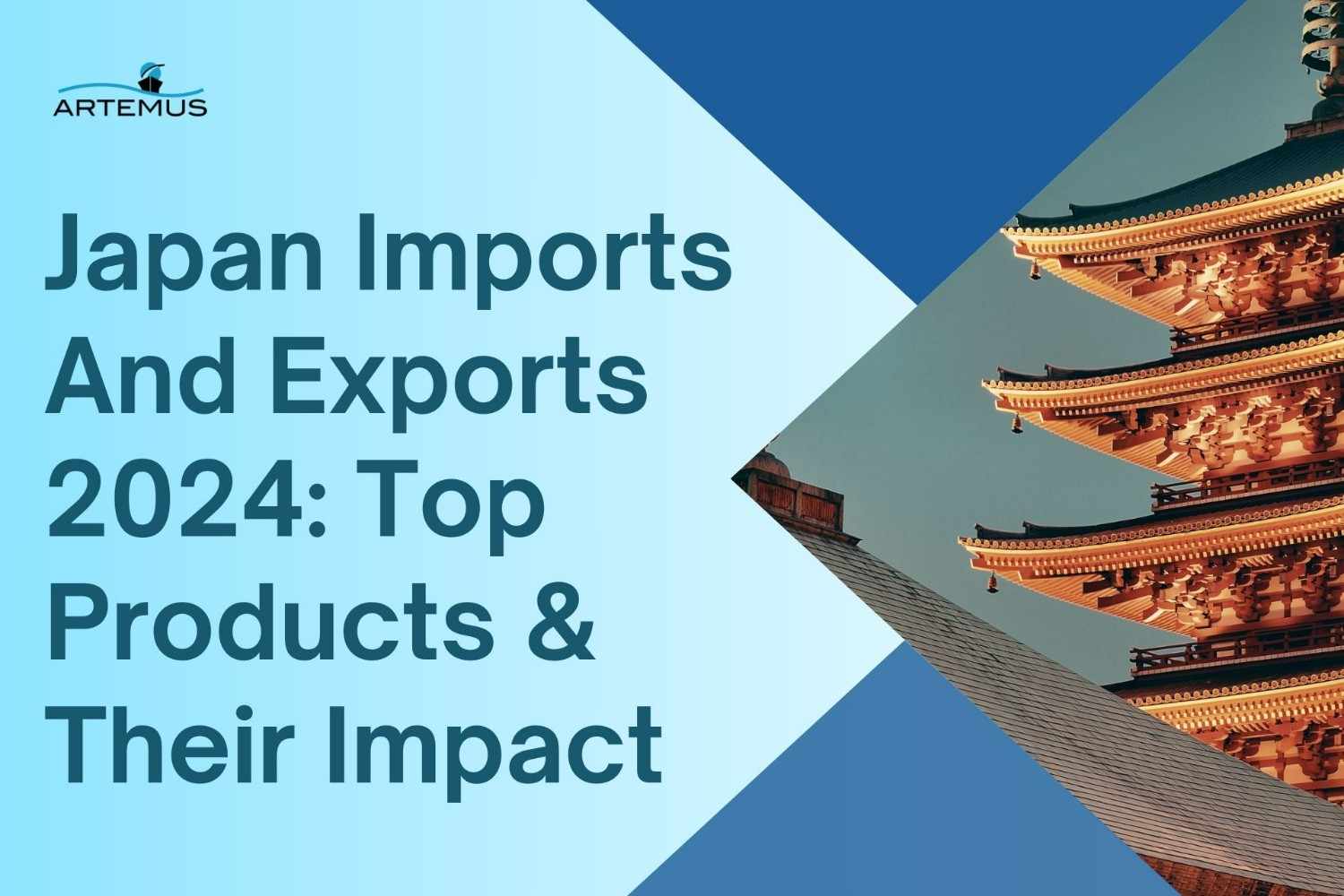
Japan Imports And Exports 2024: Top Products & Their Impact
Japan’s trade system is central to its economy, with imports like raw materials and food supporting its industries and population.
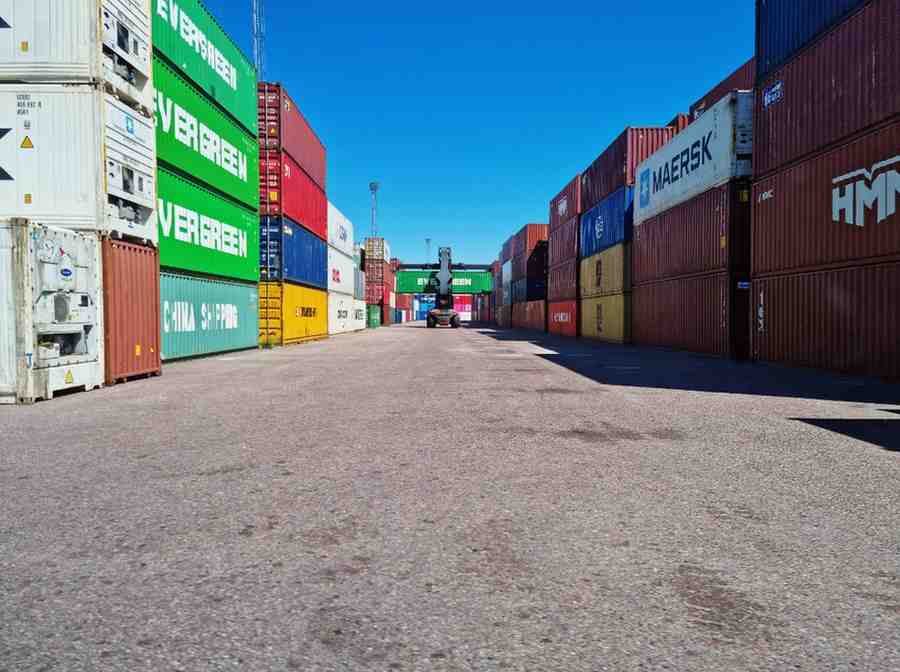
In the realm of international trade, adherence to Japan’s Advanced Filing Rules (AFR) is a critical aspect, demanding precision and efficiency in compliance. This blog explores the significance of Japan’s AFR filing, a regulatory framework aimed at fortifying security measures in the global supply chain.
Central to ensuring seamless compliance with Japan AFR is Artemus’ advanced filing software meticulously designed for businesses. Recognized for its intuitive interface and robust features, Artemus plays a pivotal role in streamlining the intricate process of AFR submission, ensuring accurate, timely, and secure electronic filing of crucial cargo information before departure.
Join us as we delve into the crucial role of Japan AFR filing and how Artemus stands as an indispensable tool for businesses navigating the ever-evolving landscape of international trade compliance.
Table Of Contents
Japan’s Advanced Filing Rules (AFR) represent a pivotal advancement in the world of international trade and customs compliance. Enforced by Japan Customs, the AFR system mandates the submission of critical electronic information regarding incoming cargo well in advance of its arrival at Japanese ports. This proactive approach serves multiple purposes, primarily streamlining customs clearance processes and fortifying the security of the supply chain.
By requiring importers and carriers to submit detailed cargo information, including shipper details, consignee information, and cargo descriptions, Japan AFR enables customs authorities to assess potential risks and allocate resources more efficiently. This not only expedites the customs clearance process but also contributes to heightened security and risk management in the importation of goods into Japan.
The core objective of Japan AFR is to minimize delays, improve data accuracy, and enhance the overall efficiency of the import process. By leveraging electronic data interchange (EDI), AFR ensures that filing is not only swift but also accurate, mitigating the common errors associated with manual paperwork.
Compliance with AFR is mandatory for importers and carriers, necessitating a shift towards digital filing and the adoption of technology solutions to facilitate seamless submissions.
Related: How To Find HTS Code? Tips For HTS Code Identification
The obligation to file Ocean Advanced Filing Rules (AFR) is a crucial aspect of international shipping, impacting various stakeholders engaged in maritime trade. Principally, the responsibility falls on the shoulders of the carrier or vessel operating in the maritime domain. Carriers, including ocean freight shipping companies and vessel operators, are required to submit detailed electronic information about incoming cargo well in advance of its arrival at the destination port.
This proactive measure aids customs authorities in assessing potential risks, streamlining customs clearance, and enhancing overall supply chain security. While carriers bear the primary responsibility, collaboration with other parties in the supply chain, such as importers and customs brokers, is often necessary to ensure accurate and timely AFR submissions. This cooperative effort helps maintain the integrity of the filing process and ensures compliance with regulations, ultimately contributing to a more efficient and secure global trade environment.
Related: HS Code VS HTS Code: 10 Differences You Need To Know
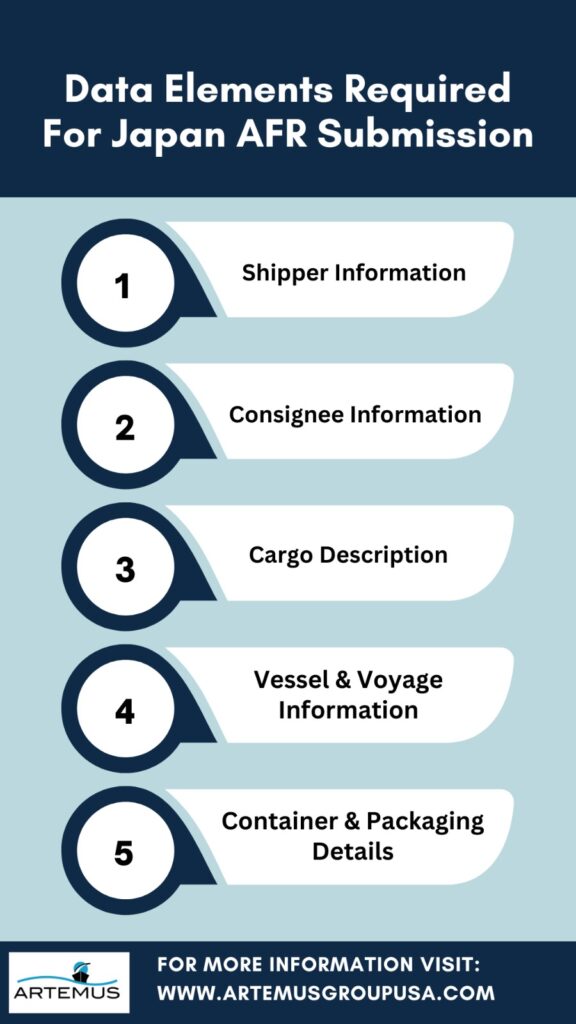
Japan’s Advanced Filing Rules (AFR) place a significant emphasis on the proactive submission of detailed information to ensure a smoother customs clearance process. Importers and carriers engaging in international trade with Japan must be well-versed in the specific details required for AFR submission to comply with regulations and prevent delays. The key information mandated for Japan AFR submission includes comprehensive details about the cargo, its origin, and the parties involved in the shipment.
1. Shipper Information: The AFR filing process begins with detailed information about the shipper. This includes the full name, address, and contact details of the entity responsible for shipping the goods to Japan. Accuracy in providing the shipper’s information is crucial, as any discrepancies may lead to complications during customs clearance.
2. Consignee Information: Equally vital is the information about the consignee, the party in Japan receiving the shipment. The consignee’s name, address, and contact details must be accurately documented to facilitate a smooth handover of the cargo upon arrival. AFR ensures that authorities have a clear understanding of both the origin and destination points of the goods.
3. Cargo Description: A comprehensive and accurate description of the cargo is paramount. This includes the nature of the goods, their quantity, weight, and any other relevant details that help customs authorities assess the contents efficiently. Precise cargo descriptions contribute to the overall accuracy of the filing and support risk management efforts.
4. Vessel & Voyage Information: To streamline the customs clearance process, AFR requires details about the vessel transporting the goods and the specific voyage. Information such as the vessel’s name, voyage number, and estimated time of arrival at the Japanese port are crucial components of the submission. These details contribute to effective scheduling and resource allocation by customs authorities.
5. Container & Packaging Details: AFR mandates information regarding the containers used for shipping, including container numbers and types. Additionally, details about the packaging, such as the number of packages and their type, aid in the proper identification and handling of the cargo during the clearance process.
Related: Customs Compliance Software: Key Benefits & Top Suggestions
Embracing compliance with Advanced Filing Rules (AFR) is a strategic move that not only aligns businesses with regulatory standards but also unlocks a host of benefits, contributing to the efficiency and security of international trade.
AFR compliance significantly enhances security measures by requiring the submission of crucial cargo information before departure. This proactive approach enables authorities to assess potential risks and implement necessary security measures, fortifying the global supply chain against potential threats and ensuring the safe transport of goods.
Pre-filing essential information facilitates a smoother customs clearance process. By providing customs authorities with advanced knowledge of incoming shipments, businesses can minimize delays, reduce congestion at ports, and expedite the clearance of goods. This streamlined process not only saves time but also contributes to a more efficient and predictable supply chain.
AFR compliance plays a pivotal role in accurate risk management. By submitting detailed information about cargo, vessels, and other relevant data in advance, authorities can conduct thorough risk assessments. This proactive approach enables the timely identification and mitigation of potential security threats, fostering a secure and resilient global trade environment.
AFR compliance is a key driver for global trade facilitation. By adhering to international security standards, businesses create a foundation of trust and collaboration with trading partners worldwide. This adherence to standardized procedures and information sharing promotes a more harmonious and efficient global trade network, contributing to the growth and success of international business relationships.
AFR compliance leads to operational efficiency by minimizing disruptions in the shipping process. With accurate and timely information submitted in advance, logistics operations can be better planned and coordinated. This not only reduces the likelihood of delays but also enhances overall supply chain efficiency, allowing businesses to meet customer expectations more reliably and maintain a competitive edge in the global marketplace.
Related: Where Can I Buy A Customs Bond? Understand Your Options
Comparing Japan’s Advanced Filing Rules (AFR) with traditional customs filing methods provides insights into the distinctive features that set them apart. Here are five detailed points highlighting the differences between Japan’s AFR and traditional customs filing:
Related: ISF Filing: A Compliance-Related Guide & Software Solution
1. User-Friendly Interface: Artemus’s AFR Filing Software boasts a user-friendly interface, making the otherwise complex process of filing cargo information straightforward. With intuitive features and a guided workflow, users can navigate the software seamlessly.
2. Efficient Data Management: Accuracy is at the core of AFR compliance, and Artemus’s software excels in efficient data management. The platform allows users to input and manage comprehensive information about shippers, consignees, cargo, vessels, and packaging details with precision.
3. Timely Filing Reminders: Never miss a deadline with Artemus’s proactive filing reminders. The software provides timely notifications, ensuring that importers and carriers submit AFR documentation well within the required timeframe to avoid penalties and delays.
4. Integrated Risk Assessment: Artemus goes beyond mere filing by integrating risk assessment functionalities. The software assists in identifying potential risks associated with cargo, allowing businesses to address concerns before the customs clearance process.
5. Data Security Measures: Recognizing the sensitivity of the information involved in AFR filings, Artemus prioritizes data security. The software employs robust security measures to safeguard confidential cargo details, providing users with peace of mind regarding information integrity.
Related: ISF 5: Meaning, Compliance Requirements, & Best Practices
In the dynamic landscape of international trade, compliance with Japan’s Advanced Filing Rules (AFR) is paramount for smooth customs clearance and efficient supply chain operations. Recognizing the evolving needs of businesses engaged in global trade, Artemus takes a bold step forward by offering cutting-edge Japan AFR Filing Software. This software solution is meticulously designed to streamline the AFR submission process, ensuring accuracy, timeliness, and adherence to regulatory requirements.
Related: What Does A Customs Broker Do? 10 Key Responsibilities
The responsibility for AFR filing lies with the party responsible for the cargo, often the shipper or an authorized representative such as a freight forwarder or NVOCC.
The security filing for cargo destined for Japan is known as Advanced Filing Rules (AFR), a regulatory framework requiring the electronic submission of essential cargo information before departure.
Shipping methods in Japan include ocean freight, air freight, and domestic land transport for comprehensive logistics solutions.
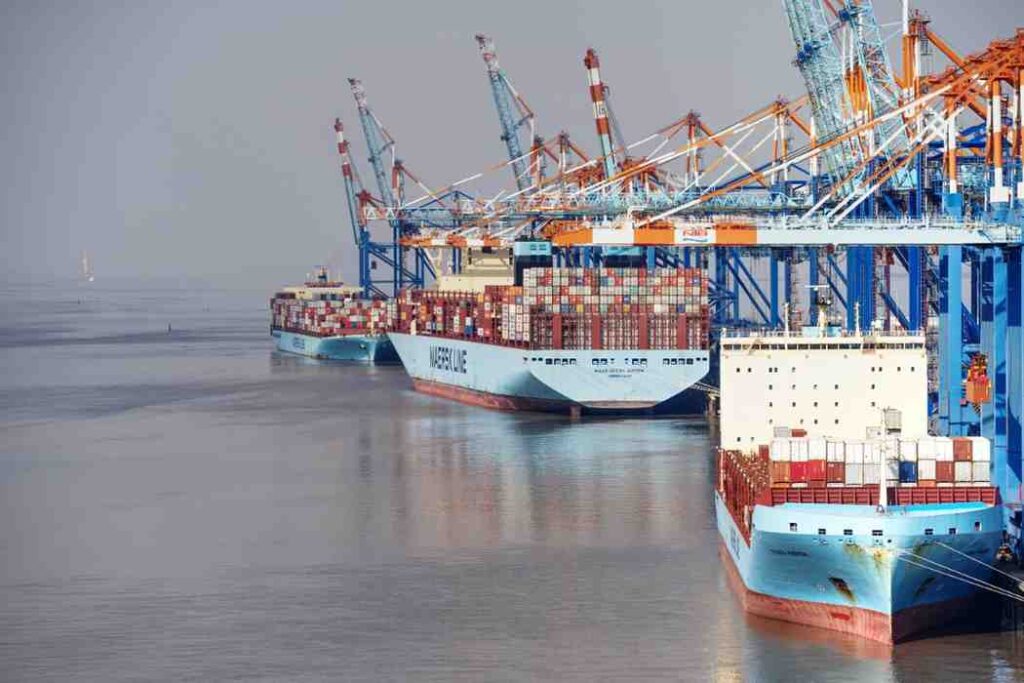
In conclusion, Japan’s Advanced Filing Rules (AFR) are integral to securing and streamlining global trade. Mandating pre-departure electronic cargo information submission, AFR reflects Japan’s commitment to a secure and efficient international supply chain. Utilizing software like Artemus is essential for businesses, ensuring a seamless and technologically advanced approach to AFR compliance. In the dynamic landscape of supply chain security, Japan’s AFR filing remains a cornerstone for fostering resilience and regulatory precision in the movement of goods.
Related: Customs Broker VS Freight Forwarder: 5 Key Differences

Japan’s trade system is central to its economy, with imports like raw materials and food supporting its industries and population.

Exporting cars from the USA involves complying with legal and customs regulations. It requires proper documentation, including title and registration,
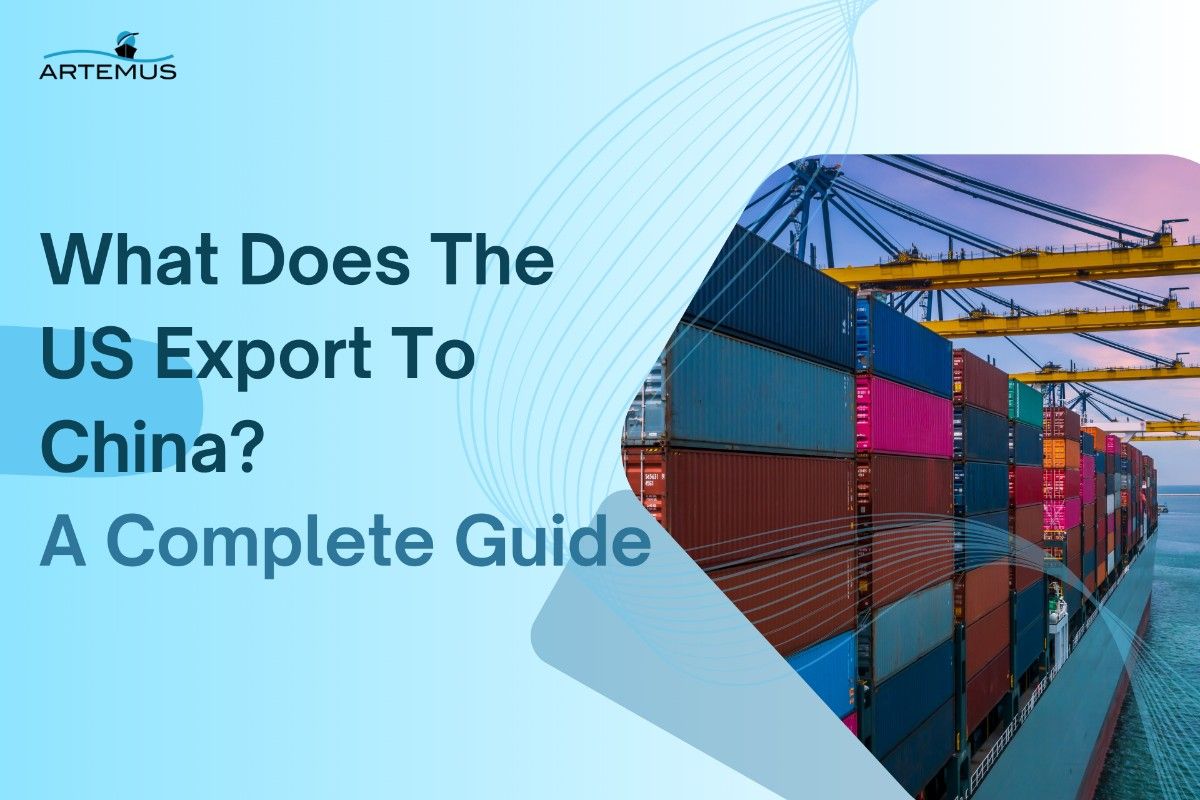
The United States exports a wide range of products to China, making it one of the largest trading relationships globally.
Get In Touch
Artemus’ Software Solutions for ISF, AMS, Japan AFR, eManifest Canada, & Panama B2B filings.